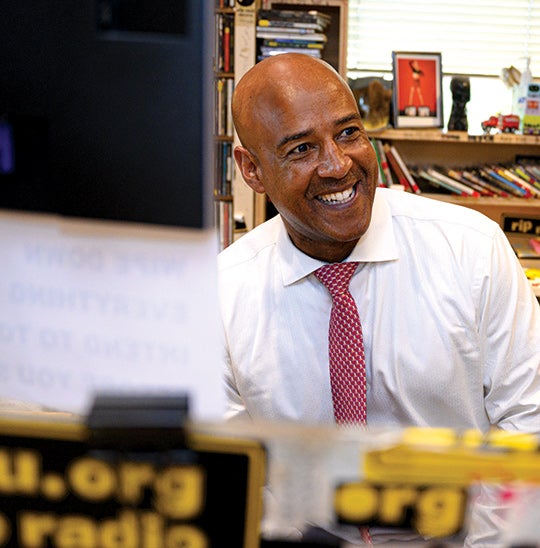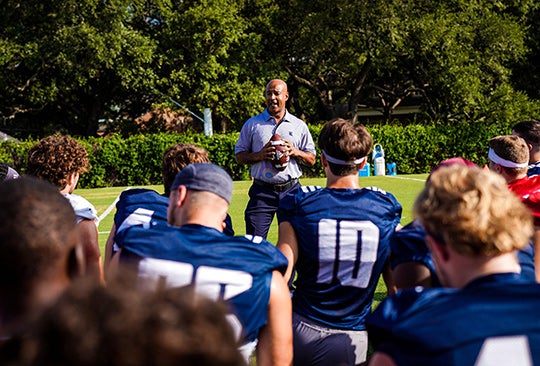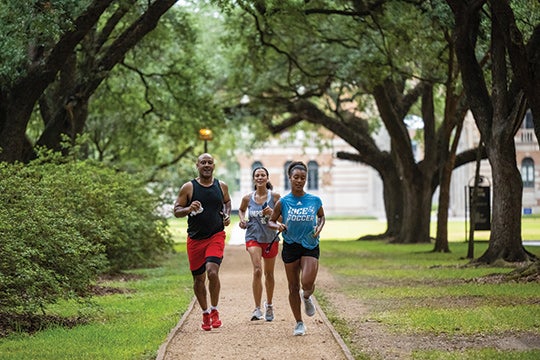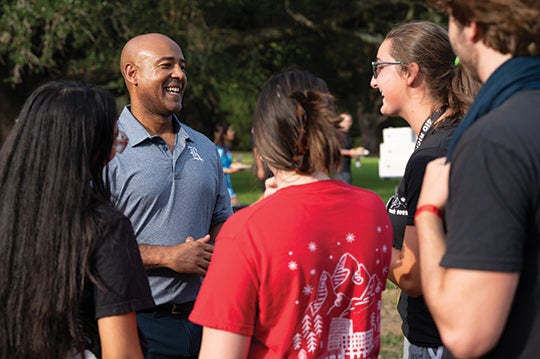Pleased to Meet You, President DesRoches
Melissa Kean ’96, Rice’s former centennial historian, sat down with Reginald DesRoches, the soon-to-be inaugurated eighth president of Rice University, for a wide-ranging interview.

Melissa Kean ’96, Rice’s former centennial historian, sat down with Reginald DesRoches, the soon-to-be inaugurated eighth president of Rice University, for a wide-ranging interview. DesRoches, the former provost and dean of the George R. Brown School of Engineering, stepped wholeheartedly into his new leadership role July 1, 2022. Kean, whose knowledge of Rice’s institutional history runs as deep as it does wide (see her blog, Rice History Corner), brought this knowledge to bear in an hourlong candid conversation. “I was most impressed with President DesRoches’ clear understanding that there are some things at Rice that need to change and some things that need to be preserved — and his thoughtfulness on finding a path through those choices,” Kean said.
Melissa Kean: So, let’s begin with who you are. Tell me about your family.
Reginald DesRoches: I was born in Haiti and came to the U.S. when I was a year old. I’m the youngest of four children — three boys and a girl — my oldest brother is nine years older than me. At the time, in the late 1960s, Haiti was under the dictatorship of Papa Doc [François Duvalier], and a lot of people were leaving the country.
There was a nursing shortage, so my mom, a nurse, was able to get a visa and come to the U.S. She actually came by herself at first, and after about nine months, she was able to get the kids and my dad to come over. When she first arrived, she didn’t know the language and didn’t have a lot of people here — that speaks to my mom; she’s just an incredible person.
We settled in Brooklyn first, before moving to Queens when I was about 5 years old. There were always other relatives coming in and out, like every traditional Haitian family. My parents were very hardworking people of faith — Catholic. My mom worked two nursing shifts almost her entire life to be able to put us through school and provide for us. She’d also cook and do all the things that women in that generation did. She was extremely strong and super smart.

MK: Did your parents push you academically?
RD: Yes, they did. I think they wanted all of us to be doctors, but I had it easier, in many ways, because I was the youngest. By the time I came along, I was able to study engineering and go away to school — to Berkeley. The others went to nearby St. John’s. My parents didn’t know about going away and living in a different place for college. By the way, my oldest brother is a doctor, my sister’s a lawyer, and my second oldest brother studied accounting, earned an MBA and is now the chief financial officer of AT&T.
MK: What do you do in your free time?
RD: When I have free time (which is not too often), I’ll watch sports, particularly pro and college football, and baseball. I’m a big New York sports fan — a Mets, Jets, and Knicks fan. For me, being a foreigner, sports were a way for me to integrate into the community. I also like to work out, typically six days a week, running, biking and weight training. It is important that I start my day with a workout.
MK: Let's talk about some of your plans for the university. One keystone is increasing Rice’s research profile. How are you going to do that?
RD: Multiple ways. As we grow the student body, we’re going to grow the faculty to make sure that we commit to the same student-faculty ratio. Bringing in really good people is the foundation of a strong university, and we have to commit ourselves to hiring the very best and keeping them here. We need to provide them with the resources and environment to be successful.
When we talk about environment, we are talking about both the right level of staff support and the physical infrastructure. I’ve talked to a number of faculty, and a common message that I hear is that even if we didn’t grow the faculty, if we were to make sure we provide the appropriate staff support and had the appropriate physical infrastructure to have a premier research university, that alone would substantially increase our productivity and impact.
MK: It’s fairly easy to see how you can significantly grow the research profile in engineering and science. It’s a little harder to see what to do in the humanities. Do you have any thoughts about that?
RD: Yes, research looks different in the humanities. We can’t expect faculty to bring in the same level of research dollars, but we can expect them to undertake great scholarship, including scholarship that has an impact. There are many examples of that, including historian Caleb McDaniel’s Pulitzer Prize research and recognition. Tony Pinn is the first person in the humanities to become a member of the American Academy of Arts and Sciences. I believe it hasn’t been part of the Rice culture to figure out how we get our faculty nominated for some of these most prestigious awards, like inductions to the national academies. If you look at our peer institutions, they’re seeing five or six faculty getting elected to one of the national academies each year. We’re in the process now of coming up with an infrastructure so we can do better because we have a lot of talented faculty members who are deserving of such recognition.
MK: Part of this involves a perennial issue at Rice: the state of the graduate programs. And graduate students have always been sort of second-class citizens on this campus.
RD: I think that one of the most important things I can do as president is to make sure that the distinction of our graduate programs is equal to the distinction of our undergraduate programs. And they’re not right now, at least not in a consistent manner.
For us to continue to recruit and keep the very best faculty talent, we have to improve the quality of the graduate programs and graduate students. Part of that is continuing to hire excellent faculty, part of it is building the research enterprise and part of it is just creating a culture where it is clear that we support our graduate programs as much as our undergraduate programs. And some things are as simple as having places that are open at night on campus for graduate students to have coffee and meals because they want to work in their labs at 9 o’clock. We don’t do enough of that right now.
I think there are some people who will be concerned that if we focus on having better graduate programs, it will diminish the undergraduate programs. Actually, it’s just the opposite, because as we improve the graduate programs, we’re going to see an improvement in the undergraduate programs, just because of the tie between the two.
MK: We’ve been hearing that exact argument at Rice since 1946. If you want to provide an undergraduate education that’s second to none, you also have to provide a graduate education that’s second to none.
RD: That’s a great way of putting it.

MK: That brings me to another topic. What are your thoughts about the future of Rice athletics?
RD: Recently, I had an interview with Brian Smith from the Houston Chronicle. He wanted to hear my thoughts on where Rice athletics is going. One of the things I have said is that our goal is to be excellent in everything we do, and that includes athletics. We have 14 sports — we’re going to commit to being as good as we can in all those sports. I’m going to support my AD and support student-athletes and give them what they need to be successful.
It has absolutely gotten more challenging with the NCAA’s new name, image and likeness policy, new transfer rules and the constant movement of schools into new conferences. Rice’s invitation to the American Athletic Conference presents a wonderful opportunity. That being said, what’s exciting is to meet these young men and women who are just unbelievable in the way they balance their athletic commitment with the demands of one of the most rigorous schools in the country. There’s a place for athletics at Rice.
MK: What do you think about the role of alumni in moving your programs and vision forward?
RD: I think part of it is just continuing to communicate and engage with all our alumni. I just went through my first O-Week and saw firsthand why people love this place and why people cherish that experience. I think we do it so well. That won't change. As our ambitions around our graduate programs, our reputation and our research are fulfilled, I’m committed to making sure that we maintain that quality of our undergraduate experience. As a university, we’re still very small, and we can grow as long as we maintain that culture of care and the uniqueness that makes this place special.

MK: What things did you see here, as dean and provost, that you really liked and that made you want to stay?
RD: I don’t think there’s a university in the country that’s as well-positioned as Rice to go to the next level of excellence. Because of our unique location in Houston, our increasing external relationships, the growth we’ve had and the talent we have brought to Rice in recent years, we have a true opportunity to take the university to the next level. I also think that the quality of our undergraduate education is second to none.
MK: A topic that’s generated sometimes heated conversation recently is the future of the statue of William Marsh Rice. It’s clear that we have a very diverse community with a wide range of opinions on this. How do we move forward, together?
RD: There was an announcement earlier this year of the intention of redesigning or reimagining the quad and relocating the statue within the quad. I think that process is ongoing. Now, it’s coming close to the end of the first phase where the Board of Trustees picks a design that best achieves the objectives outlined in the trustee letter. I’m very hopeful that this [change] will move us forward in a way that allows us to reflect the true breadth of the history of the university — as well as allows us to continue to have dialogue and discussions. I’d love to see the quad be a place where people hang out and spend time and have discussions and debates. And right now, it’s not designed to be able to do that.
I know, there’s angst out there. I just think it’s important that we continue to have the dialogue and that we make sure that we respect the range of opinions that exist out there. And not just on this topic, but on a range of topics on campus where we know there are varying opinions. You can have disagreements, and we will, but we need to be a place where you can have this kind of discourse as a university.
MK: One of the things that makes me a little bit nervous is that the faculty seem to generally see you as one of them — and that’s a lot of pressure.
RDL Out of all the things that people say, that’s probably what makes me the proudest — that they see me as one of them. In any role I’ve played, whether as department chair at Georgia Tech, as dean or as provost, I am fully aware of the central role of faculty in governance.
I know what it’s like to be a faculty member, and I’m going to continue to work really hard to engage with the faculty, be transparent and have a pulse on their concerns, so I can address them as well as possible. The faculty voice needs to be very present in the decisions that we make as a university and I heard (as part of my listening tour) that some felt as if they were not [being heard]. And we have to make sure that, going forward, we hear and engage the faculty.

MK: The other side of that, of course, is that the expectations are so high, right?
RD: I’ve been working with a group of advisers, former university presidents, from Caltech, MIT and Princeton, who are incredible. They actually had meetings with some of the senior faculty here, and a big concern they had from that is that the expectations are high. Not just for the changes people want to see, but the speed of change that people are expecting. They said that my biggest challenge is managing those expectations and letting people know it’s going to take time, things are not going to change overnight. People have to be patient with the fact that it’s going to take a lot of time to change; what I’ve been focusing on is building the leadership team to work with them to create a clear vision for Rice’s future.
MK: So you’ve moved from one end of the hallway as provost down to this end of the hallway as president. What’s different?
RD: A better view of campus, for one thing! I hear the music louder, every Friday, from Radio Free Sid. I think the job has a very different cadence. There are a lot more events where I have to be.
MK: And I believe that personal interaction is truly valued on this campus.
RD: Yes, it’s funny. I had lunch with Ruth Simmons the other day. She’s going to be the speaker at the inauguration and is giving me advice. She said that she had given the Princeton president advice when he was starting out, and he’s been there for about nine years. She said, ‘I’m giving you the same advice. Go to everything. Go out there and see everybody, especially in the first year.’ She talked about how it’s important to get out and see people and have them see your face. It sends a message that will pay dividends over the long term. So that’s what I’m doing. It is energizing and exhausting at the same time.
